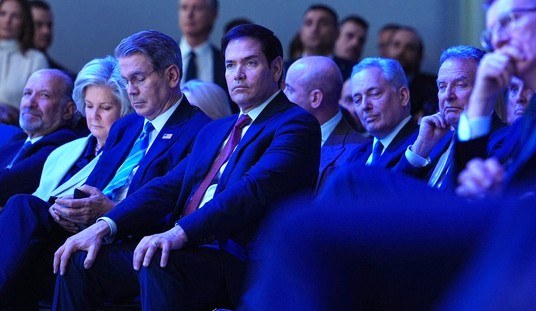A spoiler, in politics, is a challenger whose main effect is to ruin it for insider politicians.
It’s an obvious pejorative. But is the contempt for spoilers deserved?
The way politicians and some in the media talk, it is as if competition were a bad thing.
And it’s worth thinking about it now, since we may be entering the Age of Spoilers.
We are certain to witness intense political competition, anyway. Seven Republican members of Congress — three in the last two weeks — have announced their intentions to retire. The Democrats, needing 24 additional seats to gain a majority, see an opening.
Steve Kornacki, MSNBC’s national political correspondent, calls these seven “pure retirements.” That is, these politicians aren’t seeking another office, they suffer from no scandal, and are “pretty good at getting re-elected”; they’re “just deciding to leave.” Kornacki notes that the GOP had eight pure retirements in 2006 when they lost the House, and the Democrats had eleven when their majority was destroyed in 2010.
“On top of all that,” complained an exasperated Brian Williams, on his MSNBC program, The 11th Hour, “since down is up and up is down, Bannon [is] threatening to — to use the verb of the moment — primary incumbent Republicans! Which is crazy.”
Why, Steve Bannon — late of the Trump administration and now back at the helm of Breitbart News — might spoil things for his own party! Bannon is now working, CNN reports, with “conservative mega-donor Robert Mercer, who is prepared to pour millions of dollars into attacks on GOP incumbents.” Incumbent Republicans thwarting Trump, that is.
Recommended
What understandably galls folks working within a party is how those seemingly close to them would dare compete against them, risking both their chances, possibly ceding victory to those ideologically farthest apart. Indeed, the perennial trouble with spoilers, for the past few decades, has been just that kind of competition from “minor parties.” The Democratic Party has been hurt by the Greens — think of the 2000 election where Ralph Nader’s votes so consequentially subtracted from Al Gore’s — and the Republican Party has been damaged by the Libertarians — in many House and Senatorial elections.
A grand example of this kind of spoilage is in my home state of Virginia.
Virginia’s odd-year elections this November 7th offer the nation’s premier race for governor, pitting Republican Ed Gillespie against Democrat Ralph Northam . . .
. . . oh, and also Libertarian Cliff Hyra.
Virginians have seen something like this before. In 2013, notable Friend of Bill and Democratic Party nominee for governor Terry McAuliffe defeated Ken Cuccinelli, the state attorney general and Republican nominee, by a mere 2.6 percent. McAuliffe garnered 48 percent of the vote to Cuccinelli’s 45 percent . . .
. . . to Libertarian Robert Sarvis’s impressive 7 percent. In fact, the Sarvis vote more than doubled the margin between McAuliffe and Cuccinelli.
Last month, a Virginia Commonwealth University (VCU) poll of likely voters showed a tight gubernatorial race again this year with the Democrats’ Northam at 42 percent leading the Republicans’ Gillespie at 37 percent . . .
. . . oh, and the Libertarians’ Hyra at 6 percent. Once again, the Libertarian’s support proved greater than the margin between Democrat and Republican.
Back in 2014, Mr. Gillespie had challenged incumbent U.S. Senator Mark Warner, nearly pulling a stunning upset, falling just 0.8 percent short. Libertarian Robert Sarvis was also in that race, receiving 2.4 percent.
So, will the Libertarian again “spoil” it for the Republican?
Hyra, a patent attorney with no experience in public office, is pushing a tax cut that dwarfs what Republican Gillespie advocates. This might appeal to voters. But he is also campaigning on criminal justice reform, including the legalization of the recreational use of marijuana.
Surprisingly, or maybe not, Gillespie seems mobile on the pot issue. He has announced his support for legalizing medical marijuana and wants to criminalize recreational use only after two offenses.
A Libertarian influence?
Maybe. And that may be the most important way these “spoilers” make a difference: by forcing the favored candidates to bring their positions more in line with voters’ preferences.
For make no mistake: on issues like marijuana legalization and criminal reform and lower spending and tax cuts, libertarians often express majority views better than establishment Republicans do.
And this difference makes a difference. And has for some time. There are reasons why an outsider like Trump nabbed the presidential nomination, last year, from Republican Party stalwarts.
“Voter surveys have found the GOP-controlled Congress,” I stated here last weekend, “to be more popular among self-described Democrats than self-described Republicans.”
Why? Because Republican politicians are proving themselves unable — even unwilling — to legislate as they have promised. One word: Obamacare. And few dare do what voters (and Libertarians) demand: actually cut spending on anything . . . though Republicans keep campaigning on something (mythical?) called “fiscal responsibility.”
This leaves the GOP open to challenge. From Libertarians. And from non-RINO Republicans, too.
The term “spoiler” may be unfair, but without a doubt much is rotten in Washington.

























Join the conversation as a VIP Member